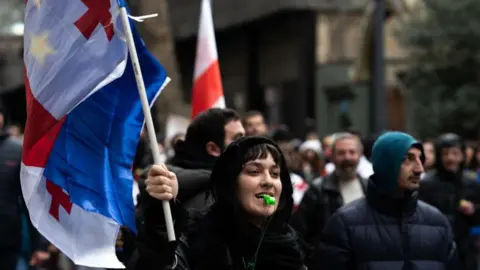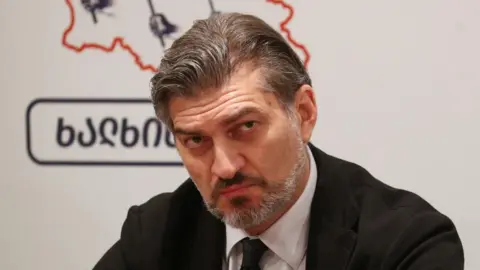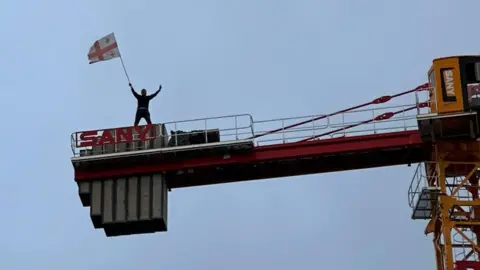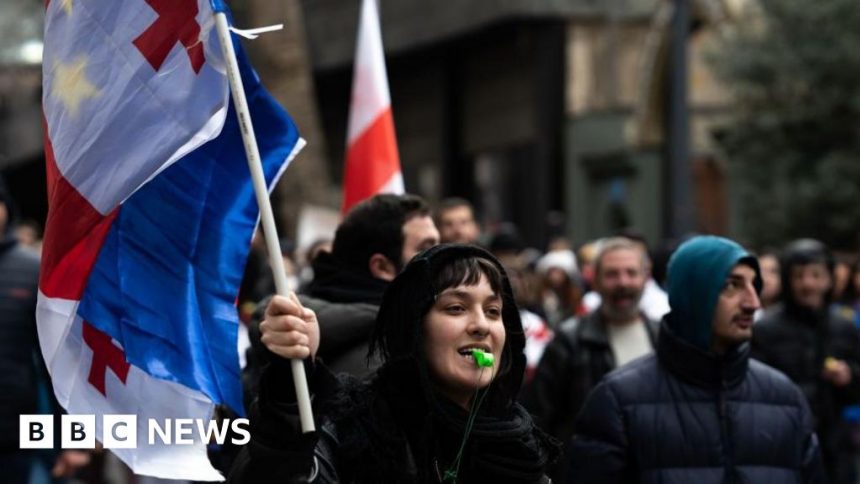Georgia’s turmoil deepens as ex-footballer to be named president
 Getty Images
Getty ImagesA former Manchester City footballer is set to be appointed Georgia’s president on Saturday, after 16 days of pro-EU protests that swept through the country’s towns and cities.
Mikheil Kavelashvili, 53, is a former MP from the increasingly authoritarian ruling Georgian Dream party. On Saturday, he is expected to be chosen by an electoral college that is controlled by that governing party.
His appointment comes after a highly contested process in Georgia’s disputed parliament – the four main opposition groups have rejected him, and are refusing to take part in parliamentary activities. They insist that elections in October were rigged.
Georgia’s outgoing pro-Western president, Salome Zourabichvili, has condemned Kavelashvili’s election as a travesty, insisting she holds Georgia’s only remaining legitimate institution.
Prime Minister Irakli Kobakhidze has accused the president of trying to harm Georgia’s interests, emphasising that when her term of office ends on 29 December, she will have to retire.
“We have very strong state institutions, so we certainly have no difficulty in bringing the situation under full control,” he was quoted as saying on Friday.
Party colleague Nino Tsilosani told reporters that Zourabichvili was no longer president in the eyes of the public.
 Reuters
ReutersProtests against Georgian Dream began immediately after the October elections but they burst into life on 28 November when the government announced it was putting EU accession negotiations on hold until 2028.
An overwhelming majority of Georgians back the country’s path to the European Union and it is part of the constitution.
Every night, the main avenue outside parliament fills with protesters draped in EU flags, demanding new elections.
Saturday’s vote in parliament is expected to take several hours and prompt a spike in anti-government protests. It will involve a direct ballot by a 300-member electoral college made up of MPs and local officials loyal to Georgian Dream from around the country.
Ahead of the vote, the capital Tbilisi was convulsed on Friday by pop-up protests involving IT specialists, public sector workers, creative industry professionals, actors and lawyers.
“We are standing here to create a legal state once and for all, to respect the provisions of the constitution and human rights,” said lawyer Davit Kikaleishvili, 47.
Kavelashvili is a founder of the People’s Power party, known for being the main voice for anti-Western propaganda in Georgia.
He has accused opposition parties of acting as a “fifth column” directed from abroad, and described President Zourabichvili as a a “chief agent”.
Kavelashvili moved into politics after he was disqualified from seeking the leadership of the Georgian football federation because he lacked the qualifications.
Although his party ran alongside Georgian Dream in the October elections, it has now decided to act in parliament as a “healthy opposition”, to fill the place of the “so-called radical opposition funded by foreign forces”.
Georgian Dream, founded by billionaire businessman and former Georgian PM Bidzina Ivanishvili, has been accused of dragging the country back into Russia’s sphere of influence.
Both the EU and US have condemned the government for democratic backsliding and more than 460 people have been detained across Georgia over the past two weeks, according to Transparency International.
More than 300 have been ill-treated or tortured, the organisation says, including dozens of people from Georgian media. Last weekend, thugs were filmed attacking a TV reporter and cameraman.
The EU has condemned the “brutal, unlawful force from the police” and foreign ministers are due to consider measures against the government when they meet on Monday.
The US state department has already imposed visa restrictions on Georgian officials, including government ministers and police.
Protesters have called on the international community to impose sanctions on top government officials as well as Bidzina Ivanishvili, Georgia’s most powerful man.
Pro-government groups have also waged a campaign of harassment towards civil society activists, beating them outside homes, and carrying out arbitrary arrests.
 Getty Images
Getty Images“There is systematic torture, inhuman and degrading treatment of citizens,” said former public rights defender Nino Lomjaria.
Theatre workers who joined the protests on Friday chanted: “The police are everywhere, justice is nowhere.”
At one point two men scaled a construction crane as protesters marched along an avenue. The pair waved a Georgian flag as the crowds cheered below.








